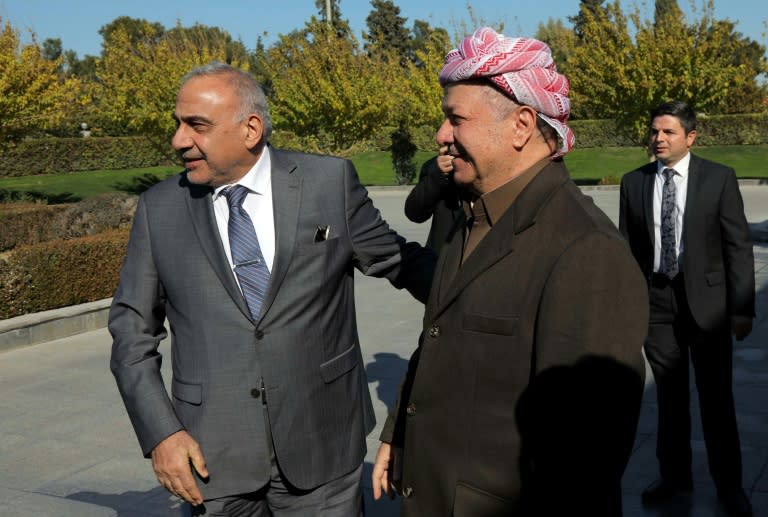AFP•January 11, 2020

Kurdish powerbroker Masoud Barzani (R) welcomes Iraqi Prime Minister Adel Abdul-Mahdi to Arbil, the capital of the autonomous Kurdistan Region of Iraq, on January 11, 2020 (AFP Photo/SAFIN HAMED)More
Arbil (Iraq) (AFP) - Iraq's caretaker premier told Kurdish leaders on Saturday he did not seek a hostile relationship with the United States, in his first visit to the autonomous region since coming to power in 2018.
Prime Minister Adel Abdel Mahdi travelled to Arbil with a delegation of top ministers and his intelligence chief.
The trip came at a time of political turmoil for Iraq, after months of anti-government rallies that saw Abdel Mahdi resign and worsening ties with the US as Iraqi lawmakers push for a withdrawal of foreign troops.
Abdel Mahdi met the region's Prime Minister Masrour Barzani, President Nechirvan Barzani and influential powerbroker Masoud Barzani, who heads the ruling Kurdistan Democratic Party.
A statement from Abdel Mahdi's office said he and the Barzanis discussed the ongoing anti-government protests, the presence of foreign troops in Iraq and broader regional tensions.
"We do not want hostility with anyone, including the United States," Abdel Mahdi said.
He then travelled to the Kurdistan region's second city, Sulaymaniyah, to meet leaders of the rival Patriotic Union of Kurdistan party.
The Kurdistan Regional Government (KRG) sees Abdel Mahdi as a reliable ally and had hoped he would help rebuild ties between Baghdad and Arbil, which frayed following the KRG's controversial independence referendum in 2017.
The KRG continued to back him as protests erupted across Baghdad and Iraq's Shiite-majority south in October, which eventually prompted Abdel Mahdi to step down.
Days before his resignation, the KRG had agreed "in principle" with Baghdad on a revenue-sharing deal that granted it a share of the 2020 federal budget in exchange for exporting its oil through the national seller.
The KRG saw the terms of the agreement as favourable and feared that Abdel Mahdi's replacement would not stick to it, but political factions have not agreed on a candidate.
Kurdish authorities have also been worried by Baghdad's insistence that foreign troops leave Iraq, following a vote in the federal parliament last week.
No Kurdish parliamentarians attended the vote and many see the US-led coalition's presence as a counterweight to Iran.
Some 5,200 US troops are stationed across Iraq to back local forces preventing an Islamic State group resurgence.
They make up the bulk of the broader coalition including troops from dozens of countries, invited by the Iraqi government in 2014 to help combat IS.
---30---
No comments:
Post a Comment